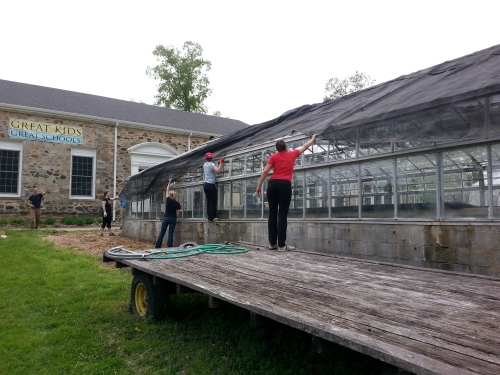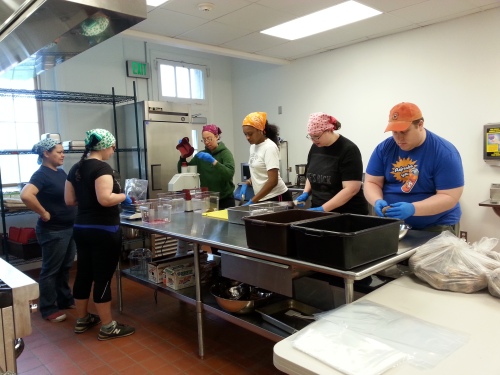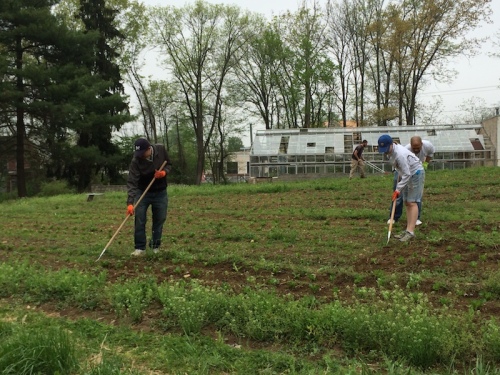By Hilary S. Jacqmin
Earlier this year, more than a dozen employees of Johns Hopkins University Press traveled to Great Kids Farm in Catonsville, Maryland, to participate in a day of service. Working together with other volunteers from JHU’s Sheridan Libraries as part of a joint effort cosponsored by the diversity committees of both entities, Press participants weeded garlic beds, repotted and composted herbs, tented a greenhouse with a shade tarp, pruned fig trees, planted marigolds, helped schoolchildren construct seed bombs, shredded beets, fed goats, and supervised kids as they bravely tasted a variety of unfamiliar herbs and leafy greens, including sorrel.
Great Kids Farm, which is owned by Baltimore City Schools, is unique: it’s the only working farm in America that is run by a public school district. Since 2008, the farm has focused on sustainability and nutritional efforts while striving, as its website puts it, to provide “opportunities for Baltimore City Public School students to understand and participate in every aspect of food preparation—from seed to fork.”
The farm takes a work-based learning approach. Younger children are introduced to the basics of plant growth, farm life, and healthy cooking and eating by completing hands-on tasks. High schoolers are eligible to apply for more intensive long-term internships. Interns are typically responsible for growing, for example, microgreens, which are then used in dishes served by local restaurants. The money earned from selling produce goes back into funding the farm and the internship program, while produce that is supplied directly to half of the public schools in Baltimore helps feed growing kids.
The day at Great Kids Farm was very special to all of the Hopkins participants. It helped us feel more connected to nature and to the soil. It gave us the opportunity to meet and collaborate with our library colleagues, friendly and interesting counterparts with a love for books that mirrors our own. It also made us realize that we are all part of Baltimore’s urban ecosystem. Not only did some of us directly reach out by helping to teach children about farming, but, by preparing food and helping edible plants thrive, we all contributed to the daily nourishment of Baltimore’s kids, some of whom lack regular at-home access to fresh vegetables because they live in food deserts.
Surprisingly, we also discovered that shredded, uncooked beets are actually one of the most popular vegetables that Great Kids Farm provides to Baltimore schools. Kids just love the sweet, earthy taste and the crisp bite of the beets. By supplying schools with vegetables and herbs that aren’t automatically considered “kid-friendly,” including Swiss chard, kale, and cilantro, the farm is helping to broaden and enliven children’s palates. Overall, our day at the farm helped us uphold the Diversity Committee’s mission to promote “inclusiveness, mutual respect, and the appreciation of multiple perspectives.” Our day amounted to 138 hours of volunteer service, equivalent to an in-kind contribution of $3,055.32.
How can you help out? Great Kids Farms is looking for volunteers throughout the year. To sign up, go to http://www.friendsgkf.org/volunteer, or donate to the farm at https://app.etapestry.com/onlineforms/FriendsofGreatKidsFarm/onlinegiving.html.
Hilary S. Jacqmin is a manuscript editor at Johns Hopkins University Press and a graduate of JHU’s Writing Seminars MA program. Among her many duties, she is the intrepid copyeditor of the JHU Press Blog.






